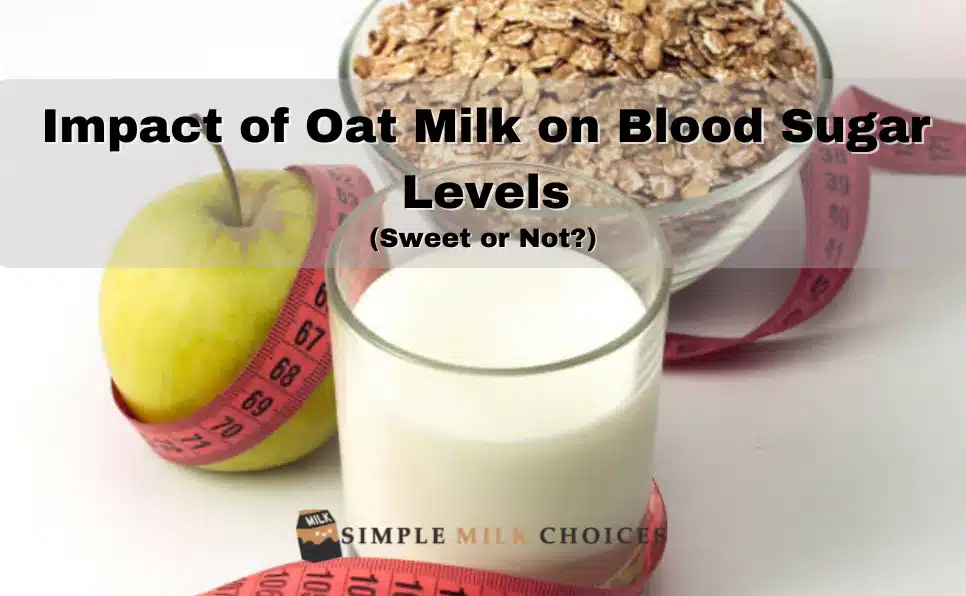Oat milk has acquired prevalence as a dairy elective, yet does it influence glucose? In order to comprehend its effects, let’s investigate how oat milk interacts with blood sugar levels.
Understanding Oat Milk Arrangement
Oat milk is made by blending oats with water. It resembles when you make a smoothie by mixing oats and water together. However, on account of oat milk, subsequent to mixing, the blend is stressed to eliminate any strong aspects, leaving a rich fluid.
Inside oat milk, there are things called starches, which incorporate sugars. These are the supplements that give us energy. Oat milk has these carbs, and that is significant in light of the fact that they can influence our glucose levels when we drink it.
Is Oat Milk a Sugar Spike?
Just as other foods contain carbohydrates, oat milk is also rich in carbohydrates. When we eat something, these carbohydrates affect the amount of glucose in our body. Be that as it may, oat milk has something unique called fiber. Fiber dials back the course of sugar entering our circulatory system. Thus, while oat milk has carbs, the fiber in it could assist with preventing unexpected spikes in glucose, making pursuing it a decent decision for some people, particularly those managing their glucose levels. However, everybody’s body is unique, so what oat milk means for somebody’s glucose can differ.
Fiber's Role in Blood Sugar Regulation
Fiber is like the superhuman in our food. It’s a piece of certain food sources, similar to oats, natural products, and veggies, that our body can’t completely separate.
When we have food sources with fiber, particularly gluten-free oat milk, it dials back how rapidly sugar gets into our blood. Imagine it as a sluggish delivery: rather than all the sugar hitting our blood rapidly, fiber assists with spreading it out more leisurely.
This slower delivery is really useful on the grounds that it prevents our glucose from rising too quickly after we eat. It resembles a health net that keeps our glucose levels more steady and dodges those unexpected spikes or crashes.
In this way, in basic words, fiber in oat milk and different food sources behaves like a friend that assists sugar from food with entering our blood all the more leisurely, keeping our energy levels consistent without unexpected ups and downs in glucose.

Exploring Glycemic Index and Oat Milk
Glycemic File (GI)
This resembles a scale that measures how rapidly the food we eat can raise our glucose. Food varieties with a high GI make our glucose shoot up quicker, while those with a low GI make a more continuous difference.
Oat Milk's GI
The glycemic index of oat milk determines how quickly it affects blood sugar levels. Most oat milk contains fewer oats than other beverages and foods. This means that it does not increase glucose.
What Does It Mean?
Since oat milk has a lower glycemic record, it’s probably going to mildly affect our glucose levels. This gradual effect can be beneficial, particularly for people attempting to control their blood sugar levels.
Effect of Oat Milk on Glucose Levels
Oat milk doesn’t cause a major, unexpected spike in glucose levels like a few different beverages could. It has carbs, which are like energy from sugars, yet it additionally contains fiber that dials back how rapidly those sugars get into our blood.
Along these lines, when we drink oat milk, our glucose will generally ascent all the more consistently and not excessively fast. This can be great for people who are maintaining their glucose levels, similar to those with diabetes, as it doesn’t cause abrupt pinnacles and crashes in glucose.
Generally speaking, contrasted with a few other sweet beverages, heated oat milk generally has a gentler impact on our glucose levels, making it a superior choice for certain people who should be aware of their sugar consumption.
Advantages of Oat Milk for Glucose the Executives Superpower:
One of the extraordinary qualities of oat milk is its high fiber content. It assists with controlling blood sugar by dialing back how quickly sugar gets into your circulatory system. That implies it doesn’t cause unexpected spikes, keeping your glucose more steady.
Low-Glycemic Companion
Oat milk will, in general, have a lower glycemic index (GI). GI estimates how rapidly food influences glucose. Since oat milk has a lower GI, it doesn’t raise glucose as quickly as a few different beverages, making pursuing it a decent decision for those maintaining their glucose levels.
Nutrient Boost
Oat milk, known for its low lactose nature, is good for more than just blood sugar; it’s also loaded with nutrients and minerals. In this way, while it’s overseeing glucose, it’s also providing your body with a sound portion of supplements.
Oat Milk in Special Diets
Oat milk in special diets explores how oat milk squeezes into explicit eating plans, similar to those for overseeing medical issues, for example, diabetes or following weight control plans that emphasize controlling glucose levels.
Diabetes-Friendly
Oat milk, with its moderate effect on glucose, can be a reasonable choice for people with diabetes. Its fiber supports steady blood sugar levels by regulating sugar absorption.
Low-Glycemic Diets
For those who want to eat fewer calories and focus on foods that don’t quickly raise blood sugar, choosing oat milk can be a good option. Its moderate glycemic record makes it ideal for those intending to keep up with stable glucose levels.
Adjusted Sustenance
Oat milk frequently contains added nutrients and minerals, offering a dietary lift. For those watching their sugar consumption, picking unsweetened adaptations can be beneficial.
Adaptability in Diet Plans
Whether following a particular eating routine for health reasons or looking for ways of overseeing glucose levels, oat milk’s moderate effect can make it a flexible expansion to different dietary plans.

Tips for Managing Blood Sugar with Oat Milk
Overseeing glucose with oat milk includes a couple of methods that can assist with keeping your levels consistent:
Control Parts
Be careful with the amount of oat milk you use. More modest bits might gently affect glucose levels.
Pair Method
Match oat milk with food varieties high in protein or healthy fats. This combo dials back sugar retention, preventing fast spikes in glucose.
Careful Utilization
Focus on how your body responds. If you notice enormous changes in glucose subsequent to having oat milk, change the amount you consume.
Consultation
If you’re dealing with diabetes or any condition affecting glucose, it’s wise to consult a medical care professional or a nutritionist. They can direct you on how oat milk fits into your eating regimen plan.
Exposing Myths and Clarifying Misconceptions
For example, some could feel that oat milk generally makes glucose levels spike, yet we’re here to make sense of the fact that it doesn’t do that for the vast majority. On the other hand, some could accept that all oat milk is equivalent with regards to influencing glucose, yet we will explain that there are contrasts based on factors like added sugars or handling.
Essentially, it’s tied in with fixing some unacceptable thoughts people could have about oat milk and ensuring they comprehend the substance realities about what it means for glucose levels.
Conclusion
Oat milk appears to decently affect glucose levels because of its fiber content. For some, it very well may be a decent dairy alternative without critical spikes. It’s essential to consider people’s reactions and dietary necessities while integrating oat milk into your eating regimen.





